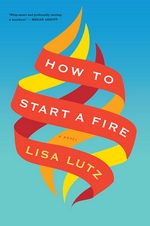 How to Start a Fire
How to Start a Fire
by Lisa Lutz
Hardcover, 337 pg.
Houghton Mifflin Harcourt, 2015
Read: June 5 – 6, 2015
 I really enjoyed Lisa Lutz’s latest, best, and most mature novel and want to encourage you to give it a read. That said, I’m not really sure how to start this post — or how to finish it, now that I think about it. It’s not really a plot-driven book, it’s more about the relationships between the three main characters, and others in their lives. But, it’s really difficult to talk about the book without talking about the two (maybe three) plot points that drive the whole thing.
I really enjoyed Lisa Lutz’s latest, best, and most mature novel and want to encourage you to give it a read. That said, I’m not really sure how to start this post — or how to finish it, now that I think about it. It’s not really a plot-driven book, it’s more about the relationships between the three main characters, and others in their lives. But, it’s really difficult to talk about the book without talking about the two (maybe three) plot points that drive the whole thing.
Early on, I jotted down the note, “I’m either going to love or hate this book,” and while I stayed in the former camp, I could easily see where some wouldn’t (a quick skim of goodreads today, suggests I was right). This book plays with chronology, skipping around throughout the 20+ year history of the characters (plus some in-chapter flashbacks), with no easily noticeable pattern. So, in the first few chapters (most of Part One), once I started a new chapter, I’d have to flip back to the first page of the 3-4 previous chapters to make sure I was placing the current one in the right spot on my mental timeline. Eventually, I didn’t have to physically turn the pages, and was able to re-arrange things without much thought — and I know two other readers that experienced the same
At its core, How to Start a Fire is about the relationships of three women over time, from meeting in college through everything that happens over the next twenty plus years — ups, downs, fights, make-ups, forgiveness, betrayal, estrangement, personal growth, self-destruction, and the ability of friendship to forget all of that and just care in the moment. To boil it down to its essence: real friendship.
I had to repeatedly remind myself that this was a Lisa Lutz novel, it didn’t feel like one. Not any of The Spellman Files or Heads you Lose, this was a totally different creature (not being a mystery novel plays into that, obviously). Of course, like with my fixation on chronology eventually I got into the book and stopped caring about that. Most of the humor is different, most of the heart is different — the types of people are different, too. Still, the humor is solid, the heart is genuine, and the people are, y’know, people.
Yet . . . there’s no denying the Lutz DNA here. The three main characters were aggressively quirky like Izzy or Rae, Anna ‘s brother could’ve been David), and Malcom has a very Henry-esque quality. There’s so much more about the novel to think about than the parallels to the Spellman books. I don’t want to focus on it, but I did make those notes at one point. I think if I hadn’t written it down, I’d have forgotten about it by the time I reached the end.
This is Chick Lit that can be appreciated by the non-Chick reader* — there’s a little bit of something for just about everything in these pages, laughs, chuckles, an “Aww” or three, and maybe a something to make your eyes misty. It’s a bit too fresh for me to confirm this, but I’m betting this is one of those novels that rewards re-reads (especially when you’re not trying to figure out what’s going on in the opening chapters). Not my favorite Lutz book, but probably her best — and it demonstrates what many of her readers have suspected: she can write whatever she sets her mind to. Frankly, I want something back in the comedy/crime area again, but I’ll line up for whatever.
—–
* Which is the mark of the best of Chick-Lit — or any genre — even those outside the target demographic can appreciate it.
—–


